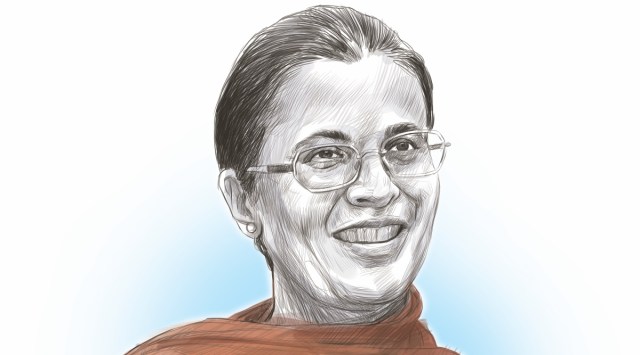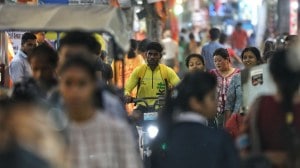- India
- International
The Sunday Profile: Woman at the door — Pakistan’s Ayesha Malik
As Pakistan’s first woman SC judge, Ayesha Malik is many things to many people — a milestone in its patriarchal society; a tough judge who gave a landmark rape ruling; even an example of gaps in judicial appointments. She herself sees her role as “a voice that nudges, to improve, to include”
 In the audience that day was Justice Ayesha Malik of the Lahore High Court, one of the organisers of the conference. (Illustration: Suvajit Dey)
In the audience that day was Justice Ayesha Malik of the Lahore High Court, one of the organisers of the conference. (Illustration: Suvajit Dey)Just over two years ago, in December 2019, then Chief Justice of Pakistan Asif Saeed Khosa told a conference of women judges that they should not conduct themselves in court like their male counterparts. At the time, Pakistan had five women judges across its five High Courts.
In widely reported remarks, he said women judges were expected to be “compassionate”, “kind, like mothers”. But, he said, “when they become judges, somehow because the whole atmosphere is male-dominated… a ‘she judge’ also likes to behave like a ‘he judge’….” Male judges cracked jokes with lawyers, Khosa added, but women judges “somehow have to change their personality. She has to become an iron lady so that nobody messes with her.”
In the audience that day was Justice Ayesha Malik of the Lahore High Court, one of the organisers of the conference. On January 24, the 55-year-old Malik, a graduate of Punjab Law College and Harvard Law School (1998), was sworn in as a justice of the Pakistan Supreme Court, becoming its first-ever woman judge. Her appointment was particularly notable as, much like parts of India, Pakistan is steeped in patriarchy, with violence against women commonplace.
As per Pakistan’s Punjab Commission on the Status of Women data, there were 746 honour crimes, nearly 1,000 reported cases of rape, 730 cases of gangrape, 31 cases of sexual harassment, and 305 cases of physical harassment in the country in 2017. The 2019 Women, Peace and Security Index ranked Pakistan 164 out of 167 countries, above only Syria, Afghanistan and Yemen.
Through the decades, Pakistani women have fought back, using every crack in the system to raise their voice, even during the tough Zia military dictatorship when the Hudood laws made it virtually impossible for rape victims to get justice. Thanks largely to women’s activists, recent years have seen several big reforms. Two years ago, after a woman was raped by two men in front of her children outside Lahore, Pakistan’s parliament approved a new, tough anti-rape law.

But access to justice for women remains poor, especially in sexual assault crimes, for which victim shaming is the default response. None other than Prime Minister Imran Khan said recently that it was “common sense” that “a woman wearing few clothes… will have an impact on the man”.
The elevation of Justice Malik comes against this background.
“PM Imran Khan has greatly exacerbated the dismal situation of gender-based violence by his statements. Let us hope Justice Ayesha Malik’s judgments will help rectify the imbalance to some degree,” says Tahira Abdullah, a leading rights activist and a member of the Women’s Action Forum of Pakistan.
In her most famous judgment, Malik had in January 2021 ruled against the controversial ‘two-finger’ virginity test for rape victims. In the Sadaf Aziz vs The Federation case, she ruled that ‘virginity’ could not be a determining factor in rape, and that there was no scientific or legal basis to the hymen test.
Quoting from the Supreme Court of India’s ruling in Rajesh & another v State of Haryana, as well as other judgments in the Gujarat and Allahabad High Courts, Malik said: “The virginity test by its very nature is invasive and an infringement on the privacy of a woman to her body… The conclusion drawn from these tests about a woman’s sexual history and character… leads to adverse effects on the social and cultural standing of a victim,” Malik ruled. “What it does is place the victim on trial in place of the accused… even the most promiscuous victim does not deserve to be raped.”
In an undated interview published on the website of the United Nations Office of Drugs and Crime, Malik, at the time in the Lahore High Court, says: “The biggest way I’ve had an impact is that I’ve become a voice. I’m there to call out the discrimination, call out stereotyping, and bring out the gender perspective. I’m the voice that nudges, reminds, and suggests ways to improve ourselves and make our system more inclusive.”
The gender issue, she says, is all about community. “You must keep in mind that, as you open one door, there is a line behind you. Don’t just open the door for yourself, step in and close it. You must keep it open for others, and that’s the tricky part.”
A mother of three, Justice Malik has her own take on the struggles of being what Khosa called a “she-judge” among “he-judges”, including finding the right work-life balance. In the UN interview, she recalls that in 2012 when she was appointed to the Lahore High Court, she was the only woman judge, and everything, from gender sensitive language to bathrooms, was a challenge. Including pointing out to fellow justices that their reference to each other as “brother judges” excluded her.
Malik doesn’t feel the need to heed to Khosa’s other advice, of amiability. Many describe her as “short-tempered”, and “not popular”.
However, she is clear that her work is not a popularity contest. In January 2019, Malik was nominated to head a four-member committee set up by the Lahore High Court to hear complaints of women judges in district courts in the Punjab province against hooliganism by lawyers. In 2020, she was reported to have ticked off a lawyer for not keeping his mask on in court.
In the UN interview, Malik says her way of creating her “space” was to “say less, do more”. She has never missed a single parent-teacher meeting at her children’s school, but has not had to take time off work. Malik says she is clear to her male colleagues that her responsibilities at home are different from theirs, as well as what work she is willing to do, and what she cannot.
For instance, as a Lahore High Court judge she made it plain that she would not travel to other benches of the Punjab High Court, as she was “a hands-on mother”, and the “central figure” of her home, and did not want to be in an “all-male living environment” for any length of time. But, she says, “I do more and show them that I can do it.”
As celebrated as Malik’s elevation to the Supreme Court has been, it has also divided the legal community, as well as women’s activists. She superseded four others — all men — in the Lahore bench, apart from others in the four High Courts, including a woman judge. This has become a sticking point, though there is no rule that the seniority principle be followed in appointments to the Supreme Court.
Malik’s candidacy for the Supreme Court was first taken up in September 2021 by the nine-member Judicial Commission of Pakistan, that appoints judges to higher courts. Lawyers, responding to calls from bar associations, alleged favouritism and a plot to create a rift among the judiciary. In the end, Malik’s appointment failed to go through.
It was taken up again on January 6, 2022. While this time too lawyers mobilised against the move, the Chief Justice refused to blink. Malik was selected, but with four of nine opposing the appointment.
Justice Faez Isa, a member of the commission, who has taken on the powerful military in his rulings and earned its wrath, has been among the most vocal against Malik’s appointment. He had sought a discussion first on the criteria for appointments to the Supreme Court before considering Malik’s name.
A cautious statement by the Women’s Action Forum of Pakistan welcoming Malik’s appointment also called for reforms and transparency in judicial appointments, “… with the equal inclusion and participation of women across the board”.
Tahira Abdullah says it is sad that a historic moment has a cloud over it. “It is a giant step towards that elusive goal of gender equality and gender justice. I just wish Justice Malik’s appointment had not become so mired in controversy, both politically as well as in terms of the raging debates on Constitutional/legal interpretation,” she says.
Nazish Brohi, a writer and researcher on violence and conflict, also makes the same point. Welcoming Malik’s appointment as “not just a token representation for women”, Brohi adds that it didn’t lessen the need for reform in judicial appointments, to make the process less arbitrary, more inclusive, an acknowledgment of merit. “For the women’s movement the question is why make Ayesha Malik the lynchpin of this debate. We should support the lawyers’ demand for reform without putting Justice Ayesha Malik at the centre of it,” Brohi says.
Some have wondered about Malik’s political leanings, given how she was appointed and Justice Isa’s opposition. However, her work has largely coalesced around gender.
Human rights activist and columnist Marvi Sirmed believes that the government picked Malik rather than the other option, of a judge from the Balochistan or Sindh High Courts. “All judges in these courts are considered either anti-establishment or too principled. They don’t suit this compromised Supreme Court,” Sirmed says. According to her, by appointing Malik, the Chief Justice “killed two birds with one stone” — prevented a “dangerous judge” from ascending in comparison to a “safe” judge like Malik, and earning for himself the label of a “progressive” by choosing a woman.
In the UN interview, Malik, who went to school in Paris, New York and London, says she had first wanted to be a criminal lawyer, perhaps inspired by the Perry Mason books she loved. Later, she wanted to put her law degree to use in policymaking. “I never thought about being a judge and adjudicating. However, when it came my way, I… saw it as another way to make a difference.”
She calls her father her biggest supporter and motivator. “He said ‘One day when you get the chance, make your presence felt.’ And that’s what I have lived by.”
Apr 20: Latest News
- 01
- 02
- 03
- 04
- 05






































